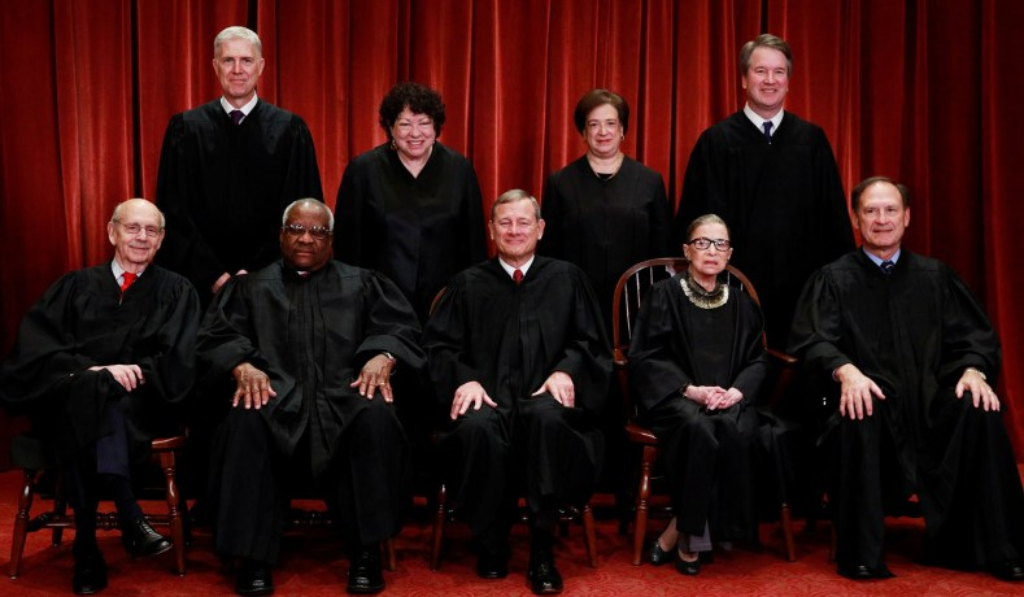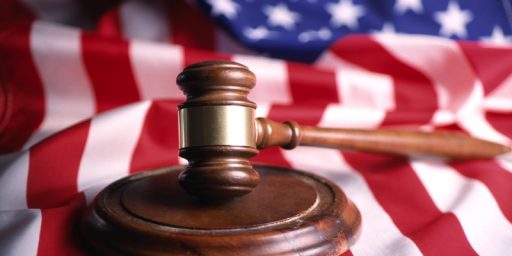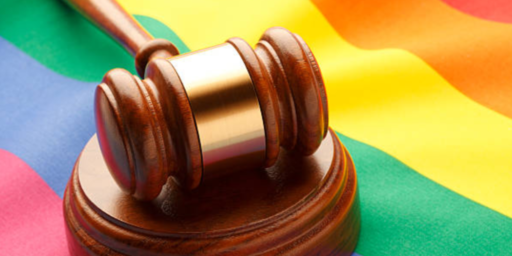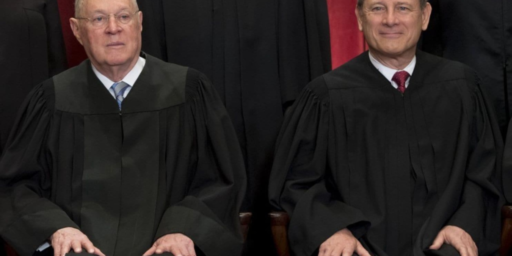Supreme Court Returns With A Politically Volatile Docket
The Supreme Court returns to work today with a significant number of high-profile cases on its docket.

The Supreme Court is set to return to work this morning and, unlike the past several years that have been relatively free of high profile cases, it looks like we’re going to see a particularly politically volatile term that just happens to coincide with a General Election:
The Supreme Court has a powerfully controversial docket for its term beginning Monday that will test Chief Justice John G. Roberts Jr.’s efforts to portray the institution as above the noisy and partisan battles of the moment.
Two unknowns — the health of the court’s oldest member, Justice Ruth Bader Ginsburg, and whether the court will be drawn into legal controversies arising from the House Democrats’ impeachment inquiry into President Trump — add to the uncertainty.
Resolution of the most contentious cases could happen in June, in the heat of a presidential campaign in which the future of the court has emerged as a galvanizing issue for conservatives and liberals.
On the court’s agenda:
●Whether federal law protects LGBTQ workers from discrimination or being fired.
●Whether the Trump administration’s efforts to end the Obama-era program that protects immigrants brought to this country as children are lawful.
●The first Second Amendment claim involving gun ownership in more than a decade.
●Whether a state may withhold aid to private religious schools if it offers funding to secular ones.
●An abortion case that gives the court’s new conservatives an opportunity to begin reconstructing its jurisprudence on what is perhaps the nation’s most divisive subject.
On the horizon, there are cases that could redefine when the government must give greater deference to a person’s religious beliefs and perhaps even a third trip to the high court for the Affordable Care Act.
Last term, after the partisan bitterness that accompanied Justice Brett M. Kavanaugh’s ascension to the court, the justices sought common ground on some issues and put off others — abortion restrictions, for instance, and Barack Obama’s Deferred Action for Childhood Arrivals program.
The delay is over, and the conservative majority — bolstered by Kavanaugh and Justice Neil M. Gorsuch, Trump’s other appointee — is in position to be more assertive this term, according to those who watch the court.
“Probably not the revolution that some seek and others fear, but we will likely see a court moving further and faster in a rightward direction,” said Irv Gornstein, executive director of the Georgetown Law Center’s Supreme Court Institute. “The docket almost guarantees it.”
We’ll take a closer look at each of these cases as they come up for oral argument, of course, but most of them deal with legal issues that should be familiar since they’ve been working their way through the court system for the past year or more and have all gotten plenty of media attention.
In a trio of cases from around the country, the court will deal with the question of whether or not the laws barring discrimination in employment based on “sex” apply to discrimination based on sexual orientation and gender identity. The Circuit Courts have ruled differently on these and similar cases, which is no doubt why the Justices accepted these cases. On one side of these cases is the argument that the drafters of Title VII of the Civil Rights Act and related laws intended to include these categories in the protections provided by the law they would have written that into the law. On the other side of the argument are the issues raised by the Supreme Court’s decision in Price Waterhouse v. Hopkins which stated that employment discrimination against someone who failed to act in conformance with the gender of their birth was barred under the law. The argument made by the claimants in these cases is that sexual orientation and gender identity fall precisely within the Price Waterhouse precedent, thus barring discrimination based on these categories.
On Friday, the Court announced that had accepted an appeal of a Louisiana law that purports to restrict abortion that was passed in 2016. In many respects, this law is similar to the law from Texas that the Court struck down two terms ago in Whole Women’s Health v. Hellerstadt et al. Like that Texas law, the Louisiana law purports to place regulations on the operation of abortion clinics that critics say will leave the state with just one operating clinic. This case is garnering attention already, of course, due to the fact that it will be the first test of Roe v. Wade and its progeny since the departure of Justice Kennedy, who was in the majority that held the Texas law to be unconstitutional. Whether this will be the start of a trend toward giving states more leeway in their abortion restrictions will be interesting to watch.
In November the Court will take up an appeal that could determine the future of the Deferred Action for Childhood Arrivals (DACA) program, which the Trump Administration has been targeting since September 2017. This case is a review of one of the many cases that held that the Administration’s efforts to end the program violated the law. The Court could take a wide range of positions on this case. It could decide that the Trump Administration’s efforts to end the program violated the law in some respect, which would leave it in place for the time being. Alternatively, it could rule for the Administration and find that the decision to end the program was proper. This would put some 800,000 beneficiaries at risk of deportation. Finally, the Justices could take the broadest possible option and rule that the program was never valid to begin with and that President Obama had operated outside of his authority when he created it. Obviously, whichever outcome the Court ends up following will have a huge impact on the politically volatile issue of immigration.
Also on the docket is what could be the first significant Second Amendment decision in a decade involving a New York City law regarding the transportation of weapons. Since the appeal was accepted, though, the city changed its law, a move which arguably makes the appeal moot and could lead to a summary dismissal instead of any kind of ruling on the merits.
A final case of interest involves an appeal of a Montana law that bars public funds from being provided to religious schools. That law is being challenged by Christian parents who sought scholarships from a scholarship program run by state that they wished to use to send their children to a Christian school. Their lawsuit was rejected by a state trial court and by the Montana Supreme Court, so the Plaintiff parents appealed to the U.S. Supreme Court.
As was the case last term, the Justice that is likely to play a huge role in determining just how far right the Court moves is none other than the Chief Justice himself:
Since the retirement of Justice Anthony M. Kennedy in 2018, Roberts is the median between four more conservative colleagues on one side and four liberals on the other.
He uses every public appearance to try to persuade that the court — with conservatives chosen by Republican presidents and liberals by Democratic ones — may be ideological but is not partisan.
“When you live in a politically polarized environment, people tend to see everything in those terms,” Roberts said last month at an event at New York’s Temple Emanu-El. “That’s not how we at the court function, and the results in our cases do not suggest otherwise.”
Roberts has noted the range of majority lineups last term, even in cases that divided 5 to 4. The court’s dominant conservatives made up the majority in only about one-third.
In the last term’s two most politically important cases — whether federal courts have a role in policing electoral maps for extreme partisan gerrymandering and whether the Trump administration could add a citizenship question to the 2020 Census forms — Roberts gave his first glimpses of how he might play his pivotal role.
Perhaps the most notable example where Chief Justice Roberts made a real difference in the outcome of a case in the Court’s first post-Kennedy term came with the case dealing with the Administration’s controversial attempt to add a citizenship question to the Census, a move that had been blocked at the District and Circuit Court levels. In a decision that raised the ire of the President, the Court, led by Roberts, held that the question could not be included because the Administration had failed in the courts below to provide a sufficient factual basis to demonstrate the need for it to be included on the Census. It was not a legally groundbreaking decision but it was perhaps an indication of the new role that Roberts saw for himself. How that plays out this term and in the coming years remains to be seen.
In any case, it all begins again at 10:00 a.m. this morning and the first big cases that the Court hears will be the LGBT employment discrimination cases noted above, which will be argued on Tuesday.. Stay tuned for further coverage.





The abortion case will definitely be decided in some way to favor the anti-abortion contingent. If Trump is re-elected there is close to a 100% chance Roe will be overturned. (I would expect SCOTUS to wait until after the election so that they would not energize the left.) On the other cases I suspect that Roberts will choose one to decide in some way to favor the left’s POV to attempt to preserve the falsehood that the court is not partisan.
Steve
Steve
Updating Mark Twain,
Yesterday James posted “The End of Consensus” and I commented citing Chris Hayes’ Twilight of the Elites to the effect our elites have screwed up left, right, and sideways. Hayes goes on to discuss “insurrrectionists” and “institutionalists”. Those who cry for reform of our institutions and those who feel the problem is lack of respect for institutions.
Does anyone doubt we’re going to see Boof and the boys trying to overthrow long standing precedents, restrained, or not, only by Robert’s desire to retain some shred of credibility for the Court? An institutionalist would argue respect for the Court is necessary for the system to function. Is that not an argument that the Court must strive to be respectable?